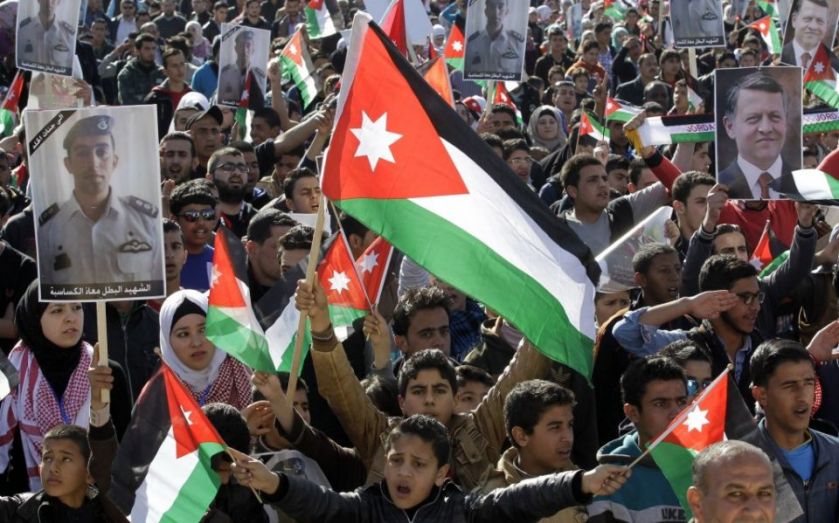Islamic State’s dominance must be halted – the West needs to act now

There are no words to describe what flight lieutenant Moaz al-Kasasbeh – the Jordanian pilot captured by Isis in Syria in December 2014 – endured at the hands of his captors. But perhaps we should remember what writer Edgar Allen Poe once said: that “there are moments when, even to the sober eye of reason, the world of our sad humanity may assume the semblance of hell”. Evil exists and the rest of us are called upon to fight it, in every generation.
The West must accept the unhappy reality that we are at war with Islamic State (IS) – because IS has decided to be at war with us. Allowing it to flourish would call into question whether there is any sort of benign global order at all. The only way to deal with such malignancy is to take IS seriously and eradicate it entirely. So the increasingly urgent question today’s leaders must ask themselves is how to do it.
First, Iraq’s newly-formed al-Abadi Shia-dominated government must be pressed to be more inclusive of the minority Kurds, and especially the Sunnis in-country. By pressing the Baghdad government, Britain and the West can help them lay the groundwork for the only sort of victory over IS that can prove lasting: a political revolt from within the Sunni tribes on the Syrian-Iraqi border. This would be much the same as that which occurred during the Awakening Revolt against IS’s predecessor, al-Qaeda in Iraq (AQI), under the leadership of American general David Petraeus in 2006-7. History has shown that only an organic political solution from within the Sunni community can truly kill off the IS vampire.
Secondly, while political conditions are ripening, British and American air strikes in Iraq must be accelerated to provide air support for our (primarily Kurdish) allies on the ground, as they continue to reverse the IS victories of last summer. As the all-party Commons Select Committee on Defence made clear last week, Britain simply must do more: at present, it conducts a paltry six per cent of all allied air strikes against IS. Military action, it said, was only one element of “comprehensive” action by the international coalition, and the UK “can and should be playing a greater role”.
And while things are marginally better in Iraq, they remain far from good. The Iraqi Army, having proved itself worthless against IS in 2014, must be entirely rebuilt from scratch – an infuriating task that Britain, America, and the rest of the West must attend to as a priority. We are still years away from eradicating IS from Iraq, which is a far easier strategic situation than we find in Syria. At least in al-Abadi and the Kurds we have genuine allies on the ground.
Finally, Britain and America must use drones and share intelligence to harass, eradicate, and disrupt IS’s senior leadership. These things must be done alongside rebuilding the Iraqi army and pressing the new government to be far more inclusive and to adopt a looser federal governmental structure, making stakeholders of both the minority Kurds and Sunnis.
But why is this massive effort called for, especially when the Western public is exhausted by previous attempts to intervene in the region? There is a practical answer: leaving IS dominant in the centre of the most volatile region in the world is surely bad for business. And leaving it to run amok across the planet’s oil epicentre, threatening both Iraq and Saudi Arabia, is to place the world’s economy in peril.
Moreover, a successful IS has already proven itself a magnet for global terrorism. With up to 20,000 foreign jihadis swelling its ranks, the caliphate has filled al-Qaeda’s shoes as the totemic symbol of Islamic fanaticism. To allow such a heinous brand name to be successful will surely encourage further terrorism on Western doorsteps.
Is this enough to compel action? Does it sufficiently explain why Britain and the West must yet again be involved in the morass of the Middle East? The answer is not a difficult one: we must fight this evil, simply because it exists. In this generation, it falls to us to stand for civilisation. It’s our turn.
Dr John C Hulsman is senior columnist at City A.M. He is a life member of the Council on Foreign Relations, and author of Ethical Realism, The Godfather Doctrine, and Lawrence of Arabia, To Begin the World Over Again. He is president and co-founder of John C Hulsman Enterprises (www.john-hulsman.com), a global political risk consultancy, and available for corporate speaking and private briefings at www.chartwellspeakers.com.